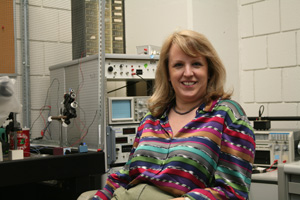Jean Hardwick’s hands hover over her heart and brain, the two most vital parts of the human body. She breathes deeply and speaks.

To a passerby, she might be performing a dramatic scene or sharing a personal love poem. But Hardwick, an associate professor of biology, is doing neither: She’s teaching neurobiology.
Through nearly 10 years of specialized research in neuroscience at Ithaca College, Hardwick has uncovered many mysteries about the way the brain communicates with the heart. Her student-assisted experiments find how chemicals released by the brain track the heart’s every movement, from beats to murmurs.
“The goal in the end is to better understand how the body makes decisions,” she said. “Changes on the minute molecular level are just as important as seeing why the heart beats faster.”
Hardwick now focuses on how nitric oxide, acting as a communicator, interacts with the heart. With the help of students, Hardwick tracks the reactions of nitric oxide–producing enzymes in the heart when an injury occurs there. Using fluorescently tagged antibodies, her students have found that when blood flow to the heart is interrupted, the immune system increases the enzymes — making more nitric oxide.
Hardwick said nitric oxide opens up blood vessels. She compared the gas to a pill many are familiar with: Viagra.
“Viagra relates by opening blood flow,” Hardwick said.
She resisted a laugh, indicating the flow goes straight to an erection. The relevancy, she said, is that people with heart disease show higher levels of nitric oxide in their hearts than healthy people do, but she can’t draw a conclusion from it yet.
“We don’t know if it’s good or bad,” she said.
If Hardwick’s openness to discuss erections with a stranger isn’t proof enough of her sense of humor and amiability, it shows her commitment to making information easier to understand.
Marc Servetnick, associate professor and chair of the biology department, said he believes Hardwick’s teaching methods, though intense, help students learn.
“She’s organized in giving sophisticated concepts in big pictures,” he said. “She’s good at introducing things at a good pace.”
Now enrolled in Hardwick’s Neurobiology class, junior Aaron Bloom is a former teaching assistant for her Principles of Biology class. He said he appreciates Hardwick’s use of original metaphors in explaining tough concepts.
“Once she compared the buildup of positive charge and ion channels in a nerve to rowdy concertgoers and security guards,” Bloom said. “Ridiculous and witty — those are the kinds of things that help even upper-level bio students understand some of the most complicated processes.”
Among many female professors with tenure in the field of biology nationwide, Hardwick was interested in neurobiology when that area of science yielded few female professionals. In graduate school she wasn’t excited about the male-dominated teaching atmosphere. She was inspired by the only female professor who taught physiology and biophysics at the University of Vermont.
“In the early ’80s, a full woman professor was unheard of,” Hardwick said. “I respected her for that. I caught the bug and kept going.”
She soon earned her post-doctorate in anatomy and neuroscience.
Hardwick’s passion for neurobiology didn’t bloom just from her respect for an accomplished professor — it’s in her genes. With a physician for a father and a zoologist mother, Hardwick isn’t surprised to see her 14-year-old son (one of three children) now interested in astronomy.
“My family has always had a strong leaning toward science,” she said. “I stuck with what I was good at. I love understanding why things happen the way they do.”
In her quest to further understand the connection between the heart and brain, Hardwick knew her research at the college would require multiple grants for lab equipment. Unfortunately, according to Servetnick, only major universities tend to receive funds for mainstream topics. Since 1998, she has been approved for more than $500,000 in external academic grants for her research.
Twenty-five years ago, it would have been rare to find a woman with a doctorate in neuroscience. Now, thanks to Hardwick, students at the college have the opportunity to study under one and minor in neurobiology. Each year, the number of participants grows. Maybe it’s because she allows students to listen to iPods during lab work. Maybe it’s her easy laugh. Hardwick thinks it’s all about the brain.
“People put the most value on the heart and brain because you can’t live without either,” she said. “Students are fascinated with the brain. We know it’s important, but not why.”




